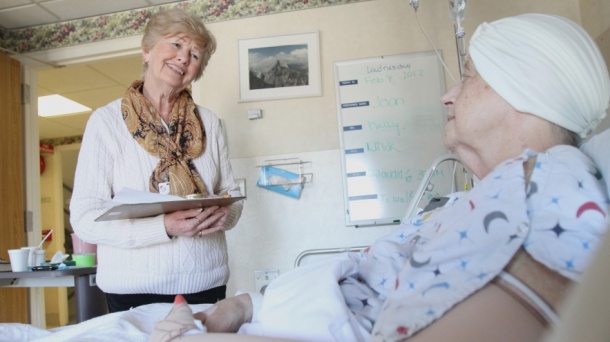Euthanasia not dead yet
Deacon Pedro
Wednesday, October 30, 2013

Two weeks ago there was a huge victory for opponents of euthanasia and assisted suicide in Canada in a case that determined that doctors must obtain consent before removing life-support from a patient.
The case was that of Hassan Rasouli who apparently was misdiagnosed as being in a persistent vegetative state since October 2010. According to his family –and apparently this is the case- even though, he relies on the use of a ventilator and a feeding tube, he is conscious and able to communicate.
The Supreme Court of Canada upheld the unanimous decision of the Ontario Court of Appeal that requires doctors to obtain consent from patients or substitute decision-makers before withdrawing life-sustaining treatment where such a decision is anticipated to result in the death of the patient.
And that’s where I think we need to make a huge clarification because a lot of people think that the Church teaches that we must prolong life no matter what. That’s not what the Church teaches; the Church merely teaches that we must not do anything to hasten death or in effect, kill the patient. This means that if the patient is dying, then we are called to make them as comfortable as possible and ease their pain but not necessarily keep them alive by extraordinary means. However, if the person is not dying, breathing on their own and their heart is beating, as was the case of Terri Schiavo, then withdrawing food and water is, in effect, murder. Terri Schiavo was not dying –she was not on a respirator– she was healthy. Food and water were administered through a feeding tube, but feeding a patient who cannot feed him or herself is not considered extraordinary care. Food and water are very much ordinary care.
But the case of Mr. Rasouli highlights another concern and that is that of consent. If Euthanasia and Assisted suicide were legalized, the fear is that doctors would be making decisions based on misdiagnosis or even on what’s more convenient or less expensive, rather than on what’s in the best interest of the patient. For some patients, their best interest is to let them die naturally and comfortably. Doing things to hasten their death or killing them is never in the patient’s best interest.
This is a very crucial time for Canadians. A week before the Rasouli court ruling, the British Columbia Court of Appeal upheld Canada’s laws prohibiting euthanasia and assisted suicide, in a 2 to 1 decision, by overturning the June 15, 2012, lower court decision of Justice Lynn Smith in the Carter case (which ruled that Canada’s assisted suicide law was discriminatory and, thus, unconstitutional).
These two decisions are encouraging for those who believe in the sanctity of human life. At the same time we should be very preoccupied by the ongoing debate over Quebec’s Bill 52 (An Act Respecting End-of-Life Care), which went into it's first vote yesterday and passed, 84 in favour and 26 against). I don't think we can ignore the fact that assisted suicide and euthanasia may be coming soon to a hospital near you. We must educate ourselves on these issues. We must reach out to our families, parishes, friends and co-workers to discuss this and share our Catholic perspective. A good place to begin is by looking at the document "Euthanasia is at our doors", recently published by the Catholic Organization for Life and Family and available on their website.
These are also topics that will be addressed at the next Euthansia Symposium, which will take place November 8-9, 2013 at the Renaissance Marriott hotel in downtown Toronto. Speakers include:
• Dr. Margaret Cottle (Canada) - Palliative care physician
• Margaret Dore (Washington State) - Choice is an Illusion
• Dr. Kevin Fitzpatrick (France) - EPC Europe
• Amy Hasbrouck (Canada) - Toujours Vivant-Not Dead Yet
• Dr. Will Johnston (Canada) - EPC - BC
• John Kelly (Massachusetts) - Second Thoughts
• Derek Miedema (Canada) - Researcher
• Dr. David Richmond (New Zealand) - Euthanasia Debate
• Henk Reitsma (Netherlands) - EPC International
• Tim Rosales (California) - Californians Against Assisted Suicide
• Paul Russell Australia - HOPE Australia
• Dr. Peter Saunders (UK) - Care Not Killing Alliance
• Alex Schadenberg (Canada) - Euthanasia Prevention Coalition
• Nic Steenhout (Quebec Canada) - Vivre dans la Dignité
• Margaret Dore (Washington State) - Choice is an Illusion
• Dr. Kevin Fitzpatrick (France) - EPC Europe
• Amy Hasbrouck (Canada) - Toujours Vivant-Not Dead Yet
• Dr. Will Johnston (Canada) - EPC - BC
• John Kelly (Massachusetts) - Second Thoughts
• Derek Miedema (Canada) - Researcher
• Dr. David Richmond (New Zealand) - Euthanasia Debate
• Henk Reitsma (Netherlands) - EPC International
• Tim Rosales (California) - Californians Against Assisted Suicide
• Paul Russell Australia - HOPE Australia
• Dr. Peter Saunders (UK) - Care Not Killing Alliance
• Alex Schadenberg (Canada) - Euthanasia Prevention Coalition
• Nic Steenhout (Quebec Canada) - Vivre dans la Dignité
For more information visit the Euthansia Prevention Coalition.
You may also be interested in looking at some of our resources on this topic.
-
Photo credit: CNS photo/Gregory A. Shemitz, Long Island Catholic)
Photo credit: CNS photo/Gregory A. Shemitz, Long Island Catholic)
Related Articles:
Tag: Carbon removal
Deacon-structing Laudate Deum and the Climate Crisis
Thursday, October 12, 2023
 Deacon Pedro
Deacon Pedro
Deacon Pedro reflects on Laudate Deum, Laudato Si', and the call for people to do something about the climate crisis.
1
SUPPORT LABEL
$50
$100
$150
$250
OTHER AMOUNT
DONATE
Receive our newsletters
Stay Connected
Receive our newsletters

Stay Connected












